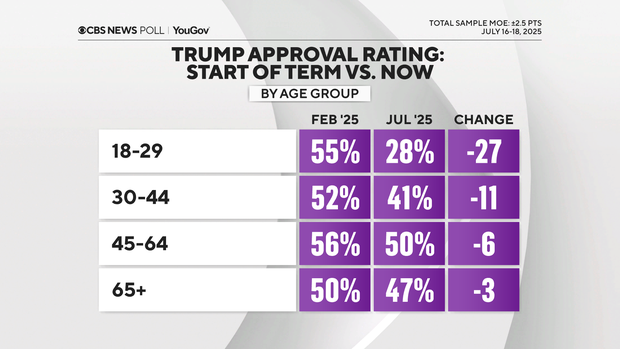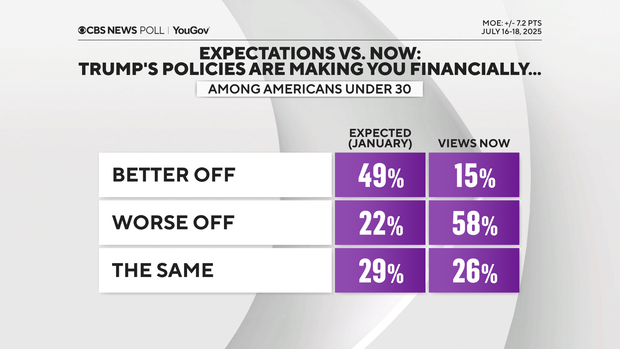Six months in, young people have soured on Trump's job handling

Since Donald Trump took office for his second term, his job ratings have markedly declined — and more with young people than any other age group. What has made so many young Americans change their minds so quickly?
For context, President Trump's electoral performance with voters under 30 improved a lot in 2024: While he lost this group to former Vice President Kamala Harris, it was by a much smaller margin than in 2020. And men under 30 ended up splitting roughly evenly between Trump and Harris. These trends prompted some observers to marvel at how conservative Gen Z had become, especially young men, and to wonder whether it marked a durable change.
About half a year on from Inauguration Day, many young people have changed their minds on Trump. It looks more like many young voters gave him the benefit of the doubt when he took office, but their evaluations of him quickly started to sink. Among Americans ages 18-29, his job approval rating has fallen from a high of 55% just after he was inaugurated to 28% now. That means that half of his former approvers now disapprove. In percentage-point terms, the size of that drop is more than double what we've seen in any other age group.

Among young people, it's the less partisan and politically engaged who have seen the steepest drops. For example, about half of independents under 30 approved of Mr. Trump in February, but that has dropped to about one in five now. The same is true of young people who didn't vote in the 2024 election. Party identifiers and '24 voters have fallen off, too, but not to the same extent.
There are also differences by gender, with young men starting out more approving of Mr. Trump than young women were. Women's ratings of the president had already begun dipping by March, while it was not until April — and the downturn in the U.S. stock market — that young men's ratings started to decline. Both have fallen steadily since then, but a faster drop among young men in the last few months has meant the gender gap in approval of Mr. Trump has shrunk. (See the bottom of this article for statistical details on estimating these smaller subgroups.)
CBS News polling over the past few months offers several clues as to what young people are unhappy about these days.
A majority now say Mr. Trump is doing different things than he promised during the 2024 campaign. That's a reversal in sentiment from early February, when seven in 10 said he's doing what he said he would. And it's young men who have been the most likely to flip on this question.
On top of that, the administration is experiencing low points on several economic evaluations:
- The share of young people saying the economy is getting worse has risen to six in 10. And young Americans are less likely than older ones to see the job market as good. Over time, young people have increasingly rated it as fairly or very bad.
- Six in 10 also tell us that Mr. Trump's policies are making them worse off financially. That is the highest we've seen to date, and it represents a complete change from what young people expected when he was inaugurated. Back then, they were much more likely to say his policies would make them better off than worse off.
- And majorities feel the Trump administration is focusing too much on tariffs (72%), deportations (64%), and ending DEI programs (55%). These shares have all grown significantly over time. By contrast, seven in 10 say the administration isn't focusing enough on lowering prices, which was a key campaign issue.

Instead of marking a permanent rightward shift, Mr. Trump's better-than-expected performance with young voters last year is beginning to look more like a temporary reaction. Indeed, less partisan voters tend to be more responsive to short-term forces, like the economic conditions that drove many at the ballot box in 2024. And when Trump was inaugurated, many young people hoped he would turn the economy around, with his initial ratings likely reflecting some optimism. This honeymoon period quickly faded. His 18-29 rating is now below Joe Biden's when he left office.
Looking ahead to 2026, Republicans' electoral success may depend on both the president's numbers and youth turnout. If views of Mr. Trump's job handling don't improve over the next year, they could be a drag on GOP congressional candidates. And while young voters are less likely to turn out in non-presidential years, both the 2018 and 2022 midterms saw record numbers go to the polls, including voters under 30. In fact, in 2022, young voters turned out at a rate that came close to saving the Democrats' majority. In a tight contest, they could be pivotal again.
Estimating small subgroups in pollsIn order to more precisely estimate trends in approval among young people, I aggregated our polls and ran a statistical model that controls for respondents' race, education level, 2024 vote, and survey date.
Why take this approach? All polls have a margin of error, and the margin of error is greater for subgroups within the poll, as a function of sample size and routine weighting. So, even though young people are represented proportionate to their share of the population, estimating what percentage of them approve of the president naturally comes with a higher margin of error. It's driven by random variation in which types of young people respond to a given poll, and margins of error grow as you slice data more thinly — for instance, in disaggregating young people by gender.
Since a single poll can only do so much, we can combine data across polls to boost sample sizes and gain confidence in our estimates. Aggregating surveys yields sample sizes of over 1,200 men and 1,300 women under 30 to analyze. And the model smoothens out poll-to-poll randomness within these subgroups.
The modeled estimates for any given time point are consistently within range of the unmodeled survey data, typically within a few points. And importantly, they tell the same story: both young men and young women's views of Trump have worsened, and the gender gap has decreased.
Kabir Khanna, Ph.D., is Director, Election Analytics & Technical Systems at CBS News. He analyzes elections and public opinion through survey research and data science tools. On election nights, he manages the team of experts responsible for projecting winners at the network Data Desk.
Cbs News





